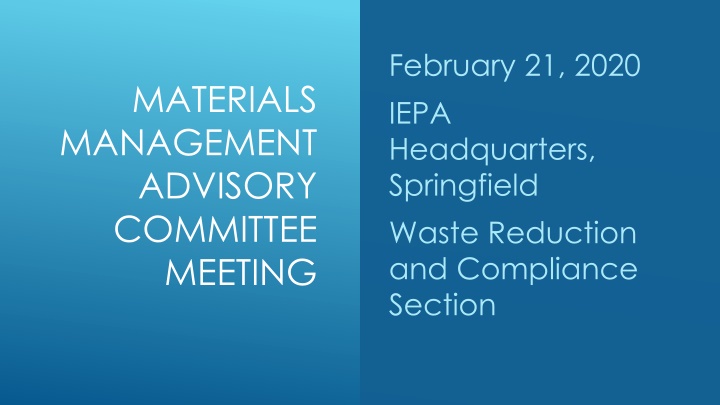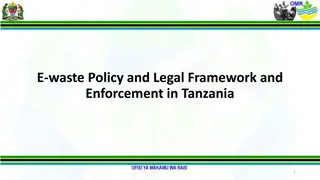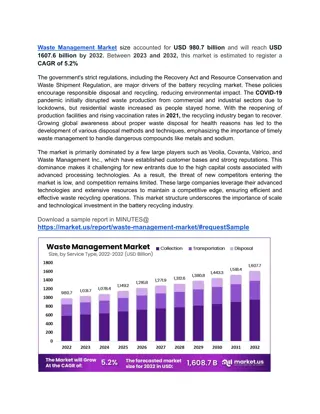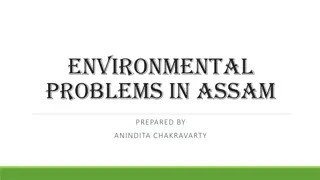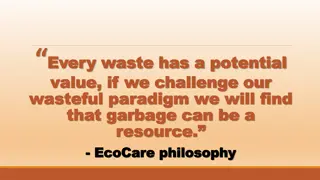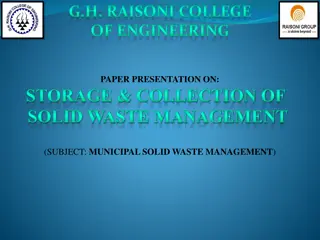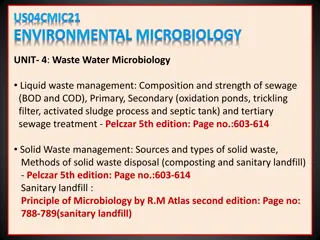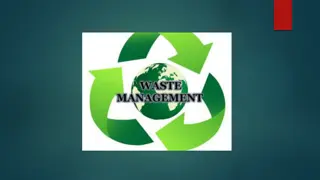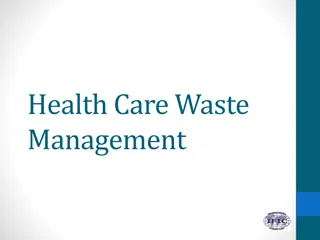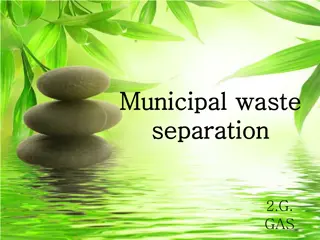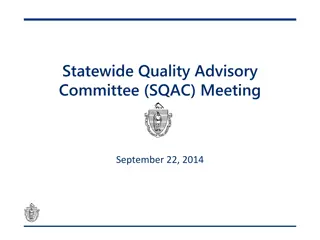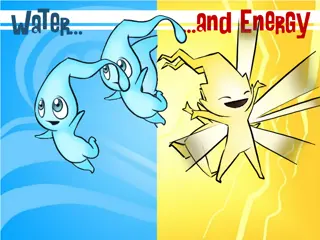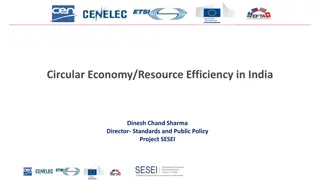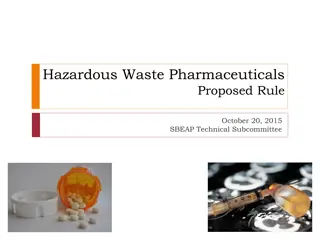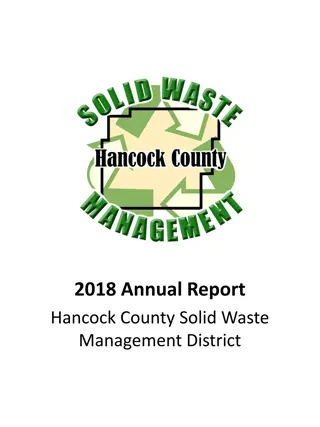Statewide Waste Management Advisory Committee Meeting Overview
Meeting overview of the Statewide Waste Management Advisory Committee discussing topics such as waste composition estimate, diversion goals, outreach and education strategies, and proposed subcommittees for market development and measurement. Co-chairs identified for Education and Outreach objectives. The meeting emphasizes the importance of public notice, meeting notes, and formal voting for actions to be taken.
Uploaded on Sep 16, 2024 | 0 Views
Download Presentation

Please find below an Image/Link to download the presentation.
The content on the website is provided AS IS for your information and personal use only. It may not be sold, licensed, or shared on other websites without obtaining consent from the author.If you encounter any issues during the download, it is possible that the publisher has removed the file from their server.
You are allowed to download the files provided on this website for personal or commercial use, subject to the condition that they are used lawfully. All files are the property of their respective owners.
The content on the website is provided AS IS for your information and personal use only. It may not be sold, licensed, or shared on other websites without obtaining consent from the author.
E N D
Presentation Transcript
February 21, 2020 IEPA Headquarters, Springfield Waste Reduction and Compliance Section MATERIALS MANAGEMENT ADVISORY COMMITTEE MEETING
Report to the General Assembly ADVISORY COMMITTEE OVERVIEW Quorum required for a meeting Majority vote of present members required for action
Each meeting is subject to public notice Meeting notes are required Formal vote required to take action Appointed members must complete OMA training within 90 days OPEN MEETINGS ACT OVERVIEW
STATEWIDE WASTE COMPOSITION ESTIMATE DIVERSION MARKET ANALYSIS MATERIALS TO TARGET FOR DIVERSION EDUCATION AND OUTREACH TO MAXIMIZE DIVERSION DIVERSION GOALS MAP OF PERMITTED FACILITIES STANDARDIZED CONTENT FOR COUNTY WASTE MANAGEMENT PLANS GENERAL ASSEMBLY REPORT CONTENTS
Statewide annual diversion volume for certain materials Education and outreach materials generated by the Agency Statewide special waste generation volume Statewide annual disposal volume INFORMATION AVAILABLE TO THE IEPA
Education and Outreach Infrastructure Development PROPOSED SUBCOMMITTEES Market Development Measurement Local Government Support Steering Committee
Co-Chairs: Jessica Schumacher and Don Buis EDUCATION AND OUTREACH Objective: Identify and propose optimal promotional concepts to maximize statewide landfill diversion Information gaps: Scope of existing education campaigns Content variation throughout the state Minimum recommended membership: Two representatives of local government One retailer One representative of the environmental community
Co-Chairs: Walter Willis and David Saladino Objective: Identify shortcomings in existing waste diversion network and propose viable improvements to address those lapses Information gaps: Diversion network deserts INFRASTRUCTURE DEVELOPMENT Waste hauler coverage geography Technology improvement opportunities Minimum recommended membership: Two representatives of local government One representative from waste industry One representative from recycling industry One representative of the composting industry
Co-chairs: Lisa Disbrow and James Jennings Objective: Identify shortcomings in existing diversion materials end markets and propose options to support and enhance those markets Information gaps: MARKET Contemporaneous commodity pricing Viable scalable success stories DEVELOPMENT Minimum recommended membership: Three manufacturers One representative from recycling industry One representative of the composting industry
Co-Chairs: Shantanu Pai and Suzanne Boring Objective: Identify data necessary to monitor success of statewide diversion efforts and the sources of those data Information gaps: Statewide recycling data Comprehensive statewide waste generation data Minimum recommended membership: Two representatives of local government One representative from waste industry One representative from recycling industry One representative of the composting industry MEASUREMENT
Co-Chairs: Jennifer Jarland and Jessica Miller Objective: Develop workable suite of tools to simplify the county solid waste management reporting process LOCAL Information gaps: GOVERNMENT SUPPORT Plan development impediments County-to-county reporting capacity variations Minimum recommended membership: Two representatives of local government One representative from waste industry One representative from recycling industry
Objective: Continually draft report to the General Assembly STEERING COMMITTEE Minimum membership: IEPA Chair of each subcommittee
15 Mar. 2020 1 June 2020 1 Oct. 2020 1 June 2021 Finalize subcommittee membership and subcommittee chairs First subcommittee meetings First draft of report Circulate final report draft to the Committee Second meeting of entire committee 1 Apr. 2020 First steering committee meeting 1 July 2020 Report to the General Assembly 1 July 2021 Finalize report contents 15 May 2021 TIMELINE
